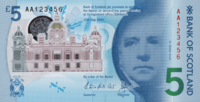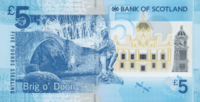Bank of Scotland £5 note facts for kids
| (United Kingdom) | |
|---|---|
| Value | £5 sterling |
| Width | 125 mm |
| Height | 65 mm |
| Security features | See-through window, raised print, security thread, mask, microlettering |
| Paper type | Polymer |
| Years of printing | 1695–present 2016–present (current design) |
| Obverse | |
 |
|
| Design | Walter Scott |
| Design date | 2016 |
| Reverse | |
 |
|
| Design | Brig o' Doon |
| Design date | 2016 |
The Bank of Scotland £5 note is a special piece of money, often called a fiver. It's a type of pound banknote issued by the Bank of Scotland. This £5 note is the smallest value banknote they make. The newest version, made of polymer (a type of plastic), came out in October 2016. It shows a picture of Sir Walter Scott on the front. On the back, you'll see a picture of the Brig o' Doon, a famous bridge. This plastic note replaced an older one made of cotton, which also had Sir Walter Scott on it.
Contents
History of the £5 Note
Early Banknotes in Scotland
Paper money first started in Scotland in 1695. This was right after the Bank of Scotland was created. The first banknotes were very simple. They were printed in one colour and only on one side. Rules for Scottish banknotes were set by a law in 1845. Later, a new law in 2009 took its place.
Scottish Banknotes and Legal Currency
Even though Scottish banknotes are not officially "legal tender" everywhere in Scotland, they are still legal currency. This means they are generally accepted as money across the whole United Kingdom. People who have Scottish banknotes have the same protection as those with notes from the Bank of England. The £5 note is currently the smallest banknote made by the Bank of Scotland.
Different Versions of the £5 Note
Unlike Bank of England notes, Scottish banknotes are not taken out of circulation in the same way. So, you might see several different versions of the Bank of Scotland £5 note. However, the Committee of Scottish Bankers asked people to use or swap their old, non-polymer £5 notes before March 1, 2018.
The Tercentenary Series (1995)
In 1995, the Bank of Scotland released a new set of notes called the Tercentenary series. This was to celebrate the bank's 300th birthday. Each note in this series had a picture of Walter Scott on the front. The £5 note had a circle on the front. This circle helped people with poor eyesight tell it apart from other notes.
The back of the £5 note showed The Mound. This is where the bank's main office is located. Each note also had a design on the back that showed something important about Scottish life or industry. For the £5 note, the design showed the oil and energy industry. There were also three symbols on the right side of the back of the note:
- Pallas, the goddess of weaving. This was a symbol of the British Linen Bank, which joined with the Bank of Scotland in 1971.
- A saltire (Scotland's flag) with gold bezants (gold circles). This is part of the bank's official symbol.
- A ship. This was the symbol of the Union Bank of Scotland, which joined with the Bank of Scotland in 1955.
The Bridges Series (2007)
In 2007, the Bridges series of banknotes came out. These notes replaced the Tercentenary series. The size and colour of the notes stayed the same. Walter Scott was still on the front. The picture of The Mound was moved to the front of the note. A new design appeared on the back, showing the Brig o' Doon. The words on the notes were updated to look more modern. Also, new large, raised numbers were added to help people who couldn't see well.
The Polymer Note (2016)
In June 2016, the design for a new polymer £5 note was shown to the public. These new notes became available on October 4, 2016. The new note is the same size as the polymer Bank of England £5 note. It still features Walter Scott on the front. The Mound also appears on both sides of the note. On the back, it is shown next to the Brig o' Doon.
Designs of the £5 Note
| Note | First issued | Colour | Size | Design | Additional information |
|---|---|---|---|---|---|
| Tercentenary | 1995 | Blue | 135 × 70 mm | Front: Walter Scott; Back: Oil and energy industry | |
| Bridges | 17 September 2007 | Blue | 135 × 70 mm | Front: Walter Scott; Back: Brig o' Doon | |
| Polymer | 4 October 2016 | Blue | 125 × 65 mm | Front: Walter Scott; Back: Brig o' Doon and The Mound |
 | Sharif Bey |
 | Hale Woodruff |
 | Richmond Barthé |
 | Purvis Young |

